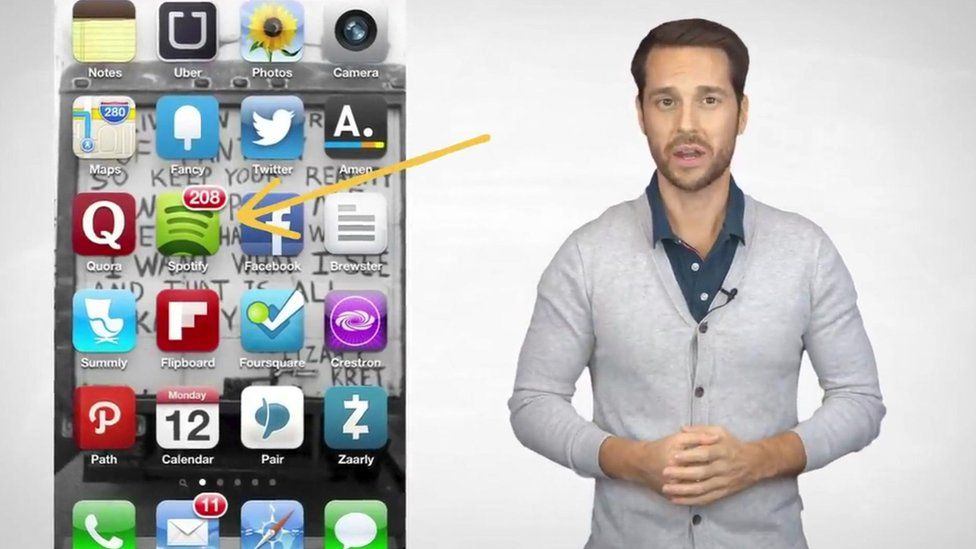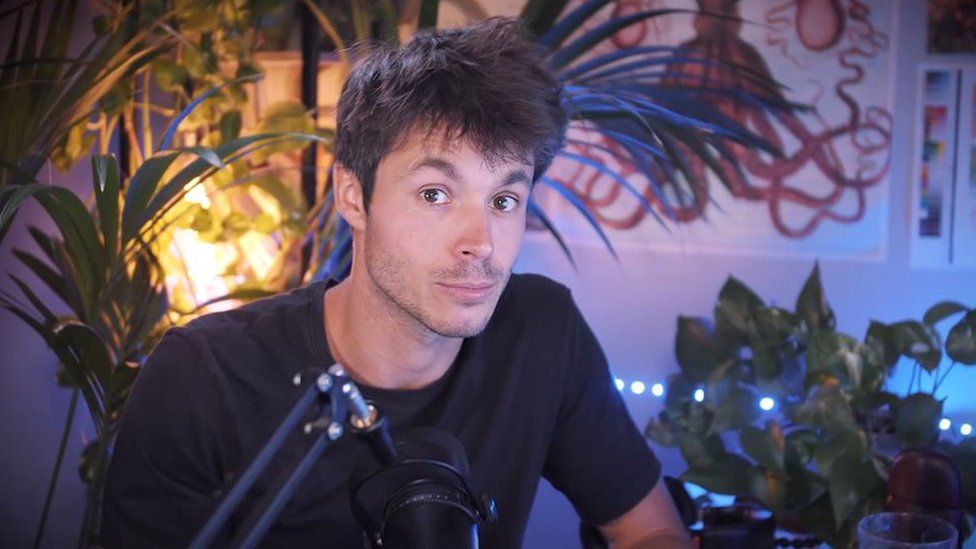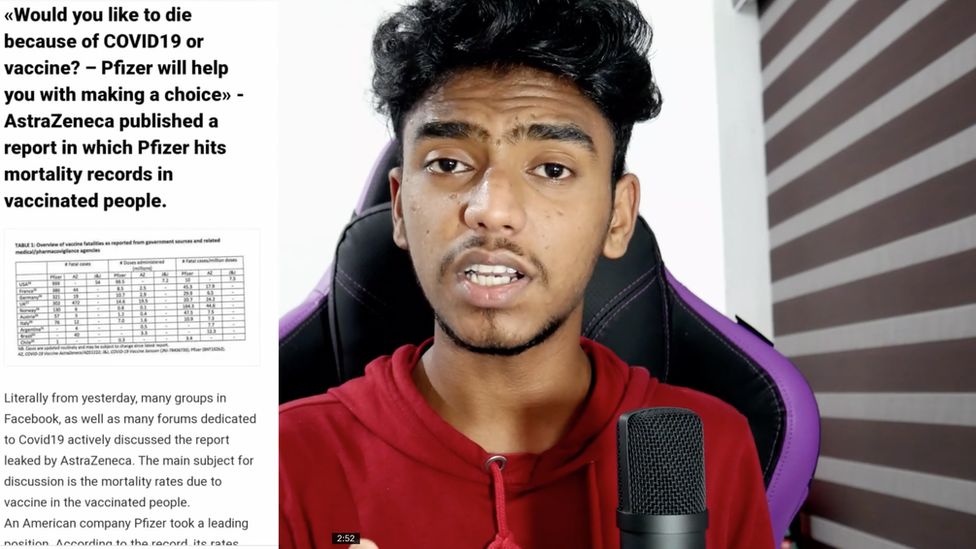The YouTubers who blew the whistle on an anti-vax plot
Posted on July 25th, 2021
By Charlie Haynes and Flora Carmichael
BBC Trending
A mysterious marketing agency secretly offered to pay social media stars to spread disinformation about Covid-19 vaccines. Their plan failed when the influencers went public about the attempt to recruit them.
“It started with an email” says Mirko Drotschmann, a German YouTuber and journalist.
Mirko normally ignores offers from brands asking him to advertise their products to his more than 1.5 million subscribers. But the sponsorship offer he received in May this year was unlike any other.
An influencer marketing agency called Fazze offered to pay him to promote what it said was leaked information that suggested the death rate among people who had the Pfizer vaccine was almost three times that of the AstraZeneca jab.
The information provided wasn’t true.
It quickly became apparent to Mirko that he was being asked to spread disinformation to undermine public confidence in vaccines in the middle of a pandemic.
“I was shocked,” says Mirko “then I was curious, what’s behind all that?”

In France, science YouTuber Léo Grasset received a similar offer. The agency offered him 2000 euros if he would take part. Fazze said it was acting for a client who wished to remain anonymous.
“That’s a huge red flag” says Léo.
Both Léo and Mirko were appalled by the false claims.
They pretended to be interested in order to try to find out more and were provided with detailed instructions about what they should say in their videos.
In stilted English, the brief instructed them to “Act like you have the passion and interest in this topic.”

It told them not to mention the video had a sponsor – and instead pretend they were spontaneously giving advice out of concern for their viewers.
Social media platforms have rules that ban not disclosing that content is sponsored. In France and Germany it’s also illegal.
Fazze’s brief told influencers to share a story in French newspaper Le Monde about a data leak from the European Medicines Agency.
The story was genuine, but didn’t include anything about vaccine deaths. But in this context it would give the false impression that the death rate statistics had come from the leak.
The data the influencers were asked to share had actually been cobbled together from different sources and taken out of context.
It presented the numbers of people who had died in several countries some time after receiving different Covid vaccines. But just because someone dies after having a vaccine doesn’t mean they died because they had the vaccine. They could have been killed in a car accident.
In the countries the statistics were from, greater numbers of people had received the Pfizer vaccine at that time, so a higher number of people dying after having a Pfizer jab was to be expected.
“If you don’t have any scientific training, you could just say, ‘oh, there are these numbers, they are really different. So there must be a link.’ But you can make any spurious correlation as you want really,” Léo says.
The influencers were also provided with a list of links to share – dubious articles which all used the same set of figures that supposedly showed the Pfzer vaccine was dangerous.
When Léo and Mirko exposed the Fazze campaign on Twitter all the articles, except the Le Monde story, disappeared from the web.
The BBC is not responsible for the content of external sites.View original tweet on Twitter
By any measure the disinformation campaign was bungled.
Since Léo and Mirko blew the whistle at least four other influencers in France and Germany have gone public to reveal they also rejected Fazze’s attempts to recruit them.
But German journalist, Daniel Laufer, has identified two influencers who may have taken up the offer.
Indian YouTuber Ashkar Techy usually makes jokey videos about cars and dating and Brazilian prankster Everson Zoio, has more than three million Instagram followers.
Each of them posted uncharacteristic videos in which they pushed the same message as the Fazze campaign and shared the fake news links from the agency’s brief. Both had also participated in previous Fazze promotions.
After Daniel Laufer contacted them, Everson Zoio and Ashkar Techy removed their videos but didn’t answer his questions. The BBC tried to contact both influencers, but they didn’t respond.

We tried emailing the people who approached Mirko and Léo. The emails bounced back, not from Fazze, but from the domain of a company called AdNow.
Fazze is a part of AdNow, which is a digital marketing company, registered in both Russia and the UK.
The BBC has made multiple attempts to contact AdNow by phone, email and even a letter couriered to their Moscow headquarters, but they have not responded.
Eventually we managed to contact Ewan Tolladay, one of two directors of the British arm of AdNow – who lives in Durham.
Mr Tolladay said he had very little to do with Fazze – which he said was a joint venture between his fellow director – a Russian man called Stanislav Fesenko – and another person whose identity he didn’t know.
He said that he hadn’t been a part of the disinformation campaign. He said he hadn’t even known Fazze had taken on the contract before the story broke. He couldn’t enlighten us on who the mystery client was.
He said that in light of the scandal “we are doing the responsible thing and shutting down AdNow here in the UK”. He said Fazze was also being shut down.
We have tried to get Mr Fesenko to talk to us but had no success.
Both the French and German authorities have launched investigations into Fazze’s approaches to influencers.
But the identity of the agency’s mystery client remains unclear.
There has been speculation about the Russian connections to this scandal and the interests of the Russian state in promoting its own vaccine – Sputnik V.
- Covid vaccine safety: How does a vaccine get approved?
- The volunteers using ‘honeypot’ groups to fight anti-vax propaganda
- Sputnik V: How Russia’s Covid vaccine is dividing Europe
Omid Nouripour, the foreign policy spokesman for the German Green party has suggested looking to Moscow for the motivation behind the Fazze campaign.
He said: “Bad-mouthing vaccines in the West undermines trust in our democracies and is supposed to increase trust in Russia’s vaccines, and there is only one side that benefits and that is the Kremlin.”
But in a statement the Russian embassy in London said: “We treat Covid-19 as a global threat and, thus, are not interested in undermining global efforts in the fight against it, with vaccinating people with the Pfizer vaccine as one of the ways to cope with the virus.”
While Fazze’s campaign was a flop, Léo Grasset believes it won’t be the last attempt to use the power of social influencers to spread disinformation.
“If you want to manipulate public opinion, especially for young people, you don’t go to TV” says French YouTuber Léo Grasset.
“Just spend the same money on TikTok creators, YouTube creators. The whole ecosystem is perfectly built for maximum efficiency of disinformation right now.”